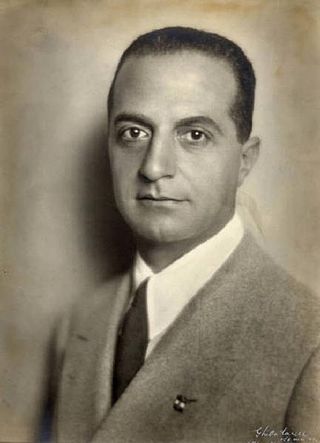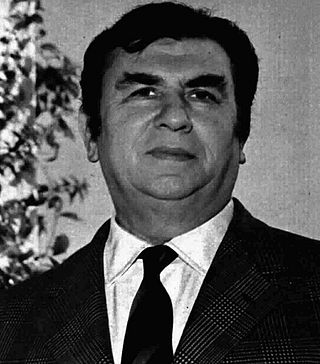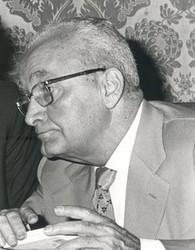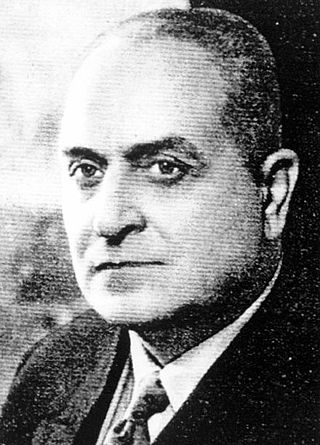Related Research Articles

Franco Modigliani was an Italian-American economist and the recipient of the 1985 Nobel Memorial Prize in Economics. He was a professor at University of Illinois at Urbana–Champaign, Carnegie Mellon University, and MIT Sloan School of Management.

Giuseppe Bottai was an Italian journalist, and member of the National Fascist Party of Benito Mussolini.

Luigi Cervi, better known as Gino Cervi, was an Italian actor. He was best known for portraying Peppone in a series of comedies based on the character Don Camillo (1952-1965), and police detective Jules Maigret on the television series Le inchieste del commissario Maigret (1964-1972).
The Nastro d'Argento is a film award assigned each year, since 1946, by Sindacato Nazionale dei Giornalisti Cinematografici Italiani, the association of Italian film critics.
Dario Graffi was an influential Italian mathematical physicist, known for his researches on the electromagnetic field, particularly for a mathematical explanation of the Luxemburg effect, for proving an important uniqueness theorem for the solutions of a class of fluid dynamics equations including the Navier-Stokes equation, for his researches in continuum mechanics and for his contribution to oscillation theory.

The Istituto Veneto di Scienze, Lettere ed Arti (IVSLA) is an academy of sciences in Venice.

Massimo Severo Giannini was an Italian politician and jurist. He was Minister from 1979 to 1980. He also was a member of the Accademia dei Lincei and vice president of the Higher Council for Cultural Heritage.
Giuseppe Ugo Papi was an Italian economist.

Luca de Samuele Cagnazzi was an Italian archdeacon, scientist, mathematician, political economist. He also wrote a book about pedagogy and invented the tonograph.
Giuseppe Barbero is an Italian economist and sociologist, specialized in the agricultural sector.

Paolo Zerbino was an Italian Fascist politician, prefect of Split and Turin during World War II and Minister of the Interior of the Italian Social Republic.
Il Selvaggio was an Italian language political and arts magazine that existed between 1924 and 1943. It was a media outlet of an intellectual group called Strapaese.

Giulio Alessio was professor of Finance and, after 1920, Political economy at the University of Padua for more than fifty years. He was not yet thirty when he produced his two volume study of the evolution of the Italian taxation system between 1861 and approximately 1900. It was one of several works that he wrote which became mainstream texts during and beyond the first half of the twentieth century. He also entered national politics, serving between 1897 and 1924 as a deputy. As political parties developed in Italy, he became a member of the Radical Party. He accepted several ministerial appointments in centre-left governments between 1920 and the coming to power in 1922 of Benito Mussolini, whose tactics and policies he excoriated.
Critica fascista was a biweekly cultural magazine which was founded and edited by Giuseppe Bottai in Rome, Italy. The magazine existed during the Fascist rule in the country from 1923 to 1943. Over time it became one of the most significant publications of the fascist period in Italy.

Gustavo Del Vecchio was an Italian economist, politician, and academic.
Cino Vitta was an Italian jurist, academic and art collector of Jewish heritage.
References
- 1 2 "Lo Stato rivista di scienze politiche e giuridiche" (in Italian). Biblioteca nazionale centrale di Roma. Retrieved 4 November 2022.
- 1 2 3 4 Luca Michelini (2020). "From Nationalism to Fascism: Protagonists and Journals". In Massimo M. Augello; Marco E.L. Guidi; Fabrizio Bientinesi (eds.). An Institutional History of Italian Economics in the Interwar Period. Vol. II. Cham: Palgrave Macmillan. pp. 44–45. doi:10.1007/978-3-030-38331-2_2. ISBN 978-3-030-38331-2. S2CID 219808630.
- 1 2 3 Francesca Dal Degan; Fabrizio Simon (2019). ""Generalist" Journals between Dissemination of Economics and Regime Propaganda". In Massimo M. Augello; Marco E.L. Guidi; Fabrizio Bientinesi (eds.). An Institutional History of Italian Economics in the Interwar Period. Vol. 1. Cham: Palgrave Macmillan. pp. 146–147. doi:10.1007/978-3-030-32980-8_6. ISBN 978-3-030-32979-2. S2CID 213105744. eBook: ISBN 978-3-030-32980-8
- ↑ Gianpasquale Santomassimo (January–March 1993). "Ugo Spirito e il corporativismo". Studi Storici. 14 (1): 98. JSTOR 20564039.